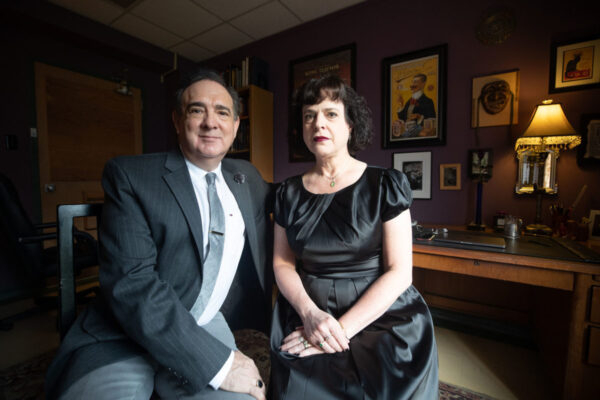Thomas Garza caught sight of something running past the door of his basement office in Calhoun Hall.
It was a blur of black hair and red lipstick accompanied by the clicking of leather heels. It was something like he had never seen before, he says, something he couldn’t get out of his mind.
So Garza asked a colleague, “Who is the person? Who’s this?”
It was 1990, and the person was Elizabeth Richmond, a new hire to the English department. Her research interests included the gothic and European drama. Her closet was filled with black clothing, and she favored a French fountain pen with purple ink.
Garza studies Russian language and culture as well as contemporary Russian and Mexican masculinities. He has taught classes on the vampire in Slavic cultures and Russian fairytales. But when he first introduced himself in the elevator, it wasn’t a fairytale beginning. By his recollection, every line he said sounded stupid.
“Hey, I’ve seen you around. My name is Tom.”
“I’m Elizabeth.”
“I’m like, OK, this is not going well,’” says Garza, now the UT Regents’ and Distinguished Teaching Associate Professor of Slavic and Eurasian Studies and the director of the Texas Language Center in the College of Liberal Arts. “We got off the elevator on different floors, and I thought, well, that’s it, you know, we’re done.”
Seeing as they’ve been married since 1993, they weren’t done by any means.
Love and bats
Elizabeth Richmond-Garza and Thomas Garza are adamant about how different they are. She’s introverted and comes from a family of academics. Garza is extroverted and is a first-generation college student. Richmond-Garza grew up all over the world, and her husband grew up in Texas.
“We’re almost complementary in the sense of the reverse image of each other,” says Richmond-Garza, now the UT Regents’ and Distinguished Teaching Associate Professor of English and director of the Program in Comparative Literature.
But they have a few things in common. They were both hired by The University of Texas at Austin in 1990, and since they were the new people back then, they had offices across from each other in the basement of Calhoun.
Her office didn’t have any windows. To trick the eye, she put up posters of punk rock bands, but it wasn’t enough. Being claustrophobic, she says she needed to leave the door open.
One night, while they both worked in their offices, bats that live in Calhoun made their way out of the ceiling tiles to feed for the night. Some flitted out of the basement. Others flew back and forth in the hallway.
“I noticed that Elizabeth’s door is open, and the first thing I think immediately is, ‘This is perfect,’” Garza says.
His plan: Wait for her to come into the hallway and be scared by the bats. Then he would take the opportunity to explain that the bats are harmless.
Little did he know, she loves bats.
“He had this sort of funny look on his face. It’s sort of like a mixture of, ‘Well, that’s great, because you really like bats, but now you’ve ruined my gambit, which was that I was going to protect you from the bats,’” Richmond-Garza says.
This was not the fairytale ending he hoped for. They did not start dating until about one year later. Both say they never thought they were the marrying type.
A fateful trip
Working with your spouse can have its ups and downs. He says it’s nice because you don’t have to fill in any blanks when it comes to talking about work.
The couple went through the tenure process together, and Garza says many people thought the stress would end their marriage.
“I think that by doing it at the same time, we actually were able to support each other a lot more than not in the process,” he says. “That in general has been the case, by working at the same place.”
On the other hand, Richmond-Garza says, there’s no escape from UT.
“What we have to then make an effort to do is to find ways of it not being UT … not because it’s bad, but just because you’ve got to get some respite. You’ve got to get some change of scene,” she says.
Their work does allow them to travel together. During the summer, they both presented academic papers at a conference in Macao.
Their travels began before they were married. When Garza had work to do in San Francisco in the spring of 1992, he decided to invite her along because her family was from Berkeley. She knew the area well, so she was the chauffeur.
Garza says he knew he wanted to marry her, so he proposed.
She didn’t say yes.
“Her line was actually quite a good one,” Garza says. “‘I’m not sure you understand what you’re asking.’ It was kind of, ‘I would say yes if I believed that you knew what you were asking, but I don’t think you do.’ She was more or less saying, ‘I don’t think you’re asking me to marry you yet for sure.’”
She didn’t say yes the second time he proposed during the trip, either.
“I don’t think I ever thought anyone was really going to marry me because I thought I was very strange,” she says.
Then one night, she took him to Stinson Beach. Garza took off his shoes and ran into the water. Because they were in Northern California, he says the water was so cold it almost froze his feet.
It was on this beach that he asked her to marry him yet again.
“There was something about the way that day went about,” Richmond-Garza says. “He’d asked a bunch of times before very sweetly. I thought, he can’t mean that; you don’t want to get involved with me. This is fun, but you don’t really want this long term.”
But on that night, watching the moon rise, she said yes.
For their wedding, they had 13 guests, counting the priest.
Common interests
They own three black cats, all with Russian names: Minka, Nastya and Musya.
“My mother says, ‘You of course would have black cats, and only you would have to have three of them,’” Richmond-Garza says.
But neither Garza is Russian.
When Richmond-Garza moved to New York in the 1980s, she says she began seeing art coming from Moscow as the communist government in the Soviet Union began its reform movement. She was interested in drama and wanted to learn Russian to read Anton Chekhov’s plays.
She would read the translated texts, but she says she knew they had to be wrong because they referenced Sigmund Freud even though the plays were written before his time.
She says she attended every Russian event she could and began to read Russian texts, all in the hopes of learning the language. But she had never visited the country.
Garza chose Russian as his major during his undergrad years. He says his interest was cemented when he visited the Soviet Union in 1979 and saw “Hamlet.” Like his future wife, he was determined to learn the language to better understand the production.
Garza has since visited Russia at least once every year. In 1995, he asked her to come with him. She started visiting Russia at least once a year, too, and they both lived there in 2000.
The year 2018 marked the couple’s 25th wedding anniversary, and 2019 was Garza’s 40th year of making trips to visit Russia.
After all this time, Garza can now answer his initial question with more elaboration. His former hallway neighbor is Elizabeth Richmond-Garza. She’s different, just like he is. She loves the theater and black cats and bats and Russian culture. She’s his wife. The Morticia Addams to his Gomez.
“Be unconventional,” Garza says. “Don’t be afraid of difference. Difference can often be one of the best things you find to bring yourself together with someone else.”




